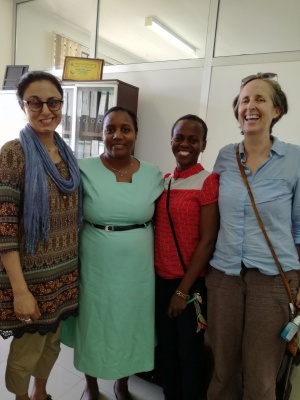Research from Birmingham into treating an aggressive childhood cancer is being taken into clinical trial across Africa.
Burkitt’s Lymphoma is the most common cancer in children in sub-Saharan Africa and accounts for 30-50% of all childhood cancers in the region. One of the fastest growing cancers, it can double in size every 48 hours. This rapid growth rate makes the tumour cells highly sensitive to intensive chemotherapy.
But the cost of drugs and specialist care needed to manage the side-effects of intensive chemotherapy can be too high for developing countries. Often, reduced intensity, risk-adapted treatments are used which have significantly worse outcomes for patients than those seen with the intensive chemotherapy.
Dr Farhat Khanim says: ‘Our aim is to develop treatments that are non-toxic but still curative. Unfortunately, certain intensive treatments have considerable side-effects and can increase the risks of a child getting cancer later in life. Our aim is to use drugs which we know are safe and don’t have long term effects.’

Rituximab is an antibody therapy used worldwide for the treatment of B cell cancers, and certain immunological conditions. It is non-toxic and has few side-effects. However, the high doses currently used for lymphoma patients are too expensive for its standard use for children in many sub-Saharan African countries.
Farhat, and her colleagues Professor Mark Drayson and Professor Chris Bunce, are working with hospitals in sub-Saharan Africa to work out if the dose of rituximab can be reduced for Burkitt’s Lymphoma patients without compromising its efficacy. They have set up a clinical trial which has been running in Malawi since late 2017 in collaboration with Professor Liz Molyneux and Dr George Chagaluka.
Burkitt’s Lymphoma patients are randomised to receive standard chemotherapy alone, or standard chemotherapy with either a single high-dose or a single low-dose of rituximab. The data indicates that the rituximab is tolerated well and has very few side-effects.
In order to recruit the 180 children needed for this study, clinical collaborators in hospitals in Cameroon, Tanzania and Ghana have also agreed to join the study. Cameroon is ready to start treating patients this month (May) and the other centres will open later in 2019.
If the trial is successful, using a lower dose of rituximab after 15 days of chemotherapy could become a standard treatment for Burkitt’s Lymphoma worldwide. However, there are wider implications. The possibility of reducing the doses of Rituximab used to treat other cancers and diseases would also need to be considered.
‘Most trials of cancer drugs assume more is better,’ says Farhat. ‘We’ll give each patient a single dose and follow them up for a year. If children are cancer free after 12 months, we’ve cured them.
‘This drug is tolerated really well and has few side effects. If we can prove we could be using a lot less of it to treat Burkitt’s Lymphoma, then this may also be true for other B cell cancers. We could save billions of pounds on healthcare worldwide while saving just as many lives.’
Fighting cancer: Pictured (left to right) are Dr Farhat Khanim with Dr Faraja, Dr Edit and Dr Trish Scanlon, paediatric oncologist, in Muhimbili National Hospital, Dar-Es Salaam, Tanzania.